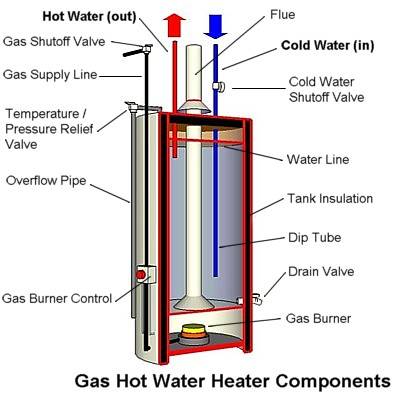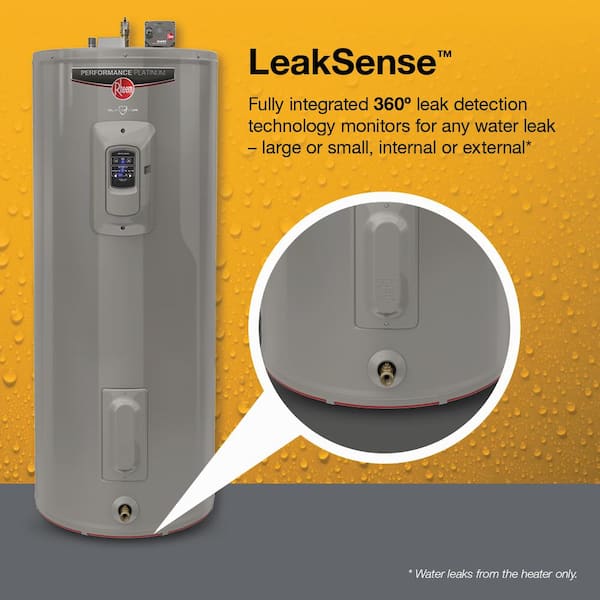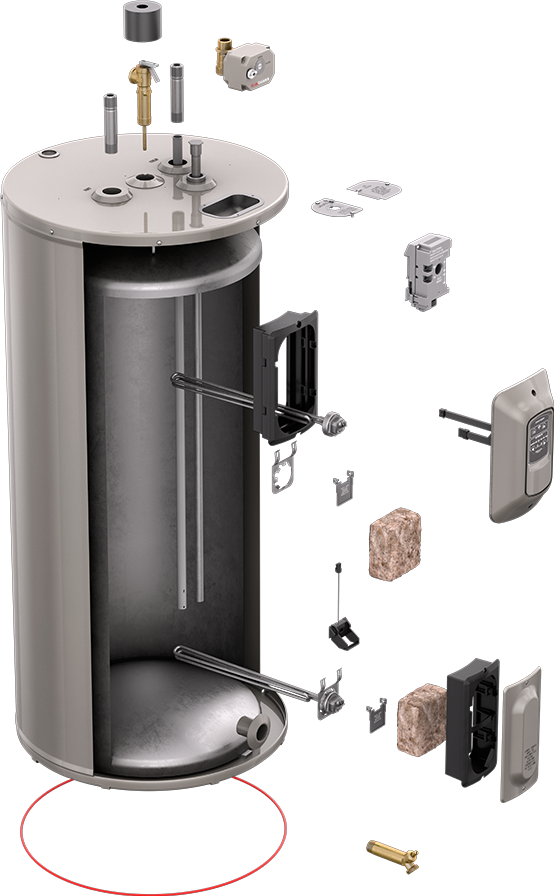A leaking water heater in your Richmond home can quickly turn from a minor annoyance into a major headache. Imagine coming home to find water pooling around your feet instead of staying snugly inside the tank where it belongs.
You might feel a mix of panic and confusion about what to do next. Rest assured, you’re not alone, and there’s a solution at hand. This article will guide you through understanding why your water heater is leaking, how to address it swiftly, and when it might be time to call in a professional.
By the end, you’ll feel more empowered and ready to tackle the issue head-on, ensuring your home remains safe, dry, and comfortable. Keep reading to discover how you can stop the leak before it disrupts your daily life.
Page Contents
Common Causes Of Water Heater Leaks
Leaking issues with Richmond water heaters often stem from loose connections or deteriorated tank linings. Faulty pressure valves and cracked pipes can also lead to water leaks. Regular maintenance can help identify these problems early, preventing costly repairs.
Is your Richmond water heater leaking? Understanding the common causes of water heater leaks can help you tackle the problem before it escalates. A leak can lead to significant water damage if not addressed promptly, and knowing what might be causing it could save you time and money. Let’s explore some of the typical reasons your water heater might be dripping or leaking.Age And Wear
As water heaters age, their components can start to wear out. Most water heaters have a lifespan of about 8 to 12 years. If your unit is approaching this age, it’s more susceptible to leaks. Regular maintenance can extend its life, but eventually, age catches up.Corrosion And Rust
Corrosion is a silent enemy of water heaters. Over time, minerals in the water can cause the tank to rust. This corrosion weakens the structure, leading to leaks. Have you checked your anode rod lately? It’s a simple component that prevents rust, yet many overlook it.Faulty Pressure Relief Valve
A faulty pressure relief valve is a common culprit for leaks. This valve releases excess pressure from the tank. If it’s not functioning properly, the pressure can build up and cause leaks. Ever noticed unusual moisture around your heater? It might be time to inspect the pressure relief valve.Loose Pipe Connections
Loose connections can easily result in water seepage. Pipe connections can loosen over time due to vibrations or thermal expansion. A quick tightening might solve the problem. Have you ever tightened a loose connection yourself? It’s a straightforward fix that could save you a service call. Addressing these issues early can prevent larger problems down the line. Have you experienced any of these with your water heater? Understanding these causes allows you to act swiftly and keep your home dry and safe.
Credit: www.stemmleplumbing.com
Immediate Steps To Take
Discovering a water heater leak in Richmond? Turn off the water supply immediately. Then, shut off the power to the heater. This prevents further damage and potential hazards. Next, contact a professional plumber to assess and repair the issue.
Finding a leaking water heater can be a homeowner’s nightmare, especially when water starts pooling around the unit. The good news is, by acting swiftly, you can minimize potential damage and even save on costly repairs. Here are some immediate steps you can take to address a leaking Richmond water heater effectively.Shutting Off Water Supply
First, locate the cold water supply valve, usually positioned above your water heater. Turn this valve clockwise until it stops, which will halt the water flow into the heater. If the valve is stuck, don’t force it; instead, consider calling a professional to avoid further damage.Turning Off Power Source
Safety should be your top priority. For electric water heaters, switch off the power at the circuit breaker to prevent any electrical hazards. If you have a gas water heater, carefully turn the gas valve to the ‘off’ position to stop gas flow.Draining The Water Heater
Next, attach a garden hose to the drain valve at the bottom of the water heater. Run the hose to a safe drainage location, like a floor drain or outside. Open the drain valve and let the water flow out, relieving pressure and removing potentially damaging water from your home. Have you ever thought about how a simple turn of a valve can prevent hundreds of dollars in water damage? By taking these immediate steps, not only do you protect your home, but you also take control of a potentially stressful situation. Remember, while these are initial measures, consulting a professional for a thorough inspection remains crucial to ensure your water heater is back in top shape.Temporary Fixes
Dealing with a leaking Richmond water heater can be frustrating. While waiting for professional help, temporary fixes can help reduce the leak. These fixes are not permanent solutions. They can help manage the situation temporarily. Below are some simple methods you can try.
Applying Sealants
Sealants can temporarily stop small leaks. Purchase a waterproof sealant from a hardware store. Clean the area around the leak. Apply the sealant generously and let it dry. This can help hold the water for a while. Remember, this is not a permanent fix.
Using Pipe Tape
Pipe tape is useful for stopping leaks. Wrap the tape around the leaking joint. Make sure it is tight and covers the area well. This stops the water from leaking out. Pipe tape is inexpensive and easy to use. It offers a quick, short-term fix.
Tightening Connections
Loose connections can cause leaks. Check all the connections on your water heater. Use a wrench to tighten them if needed. Be careful not to over-tighten, as this can cause damage. Tightening can stop leaks caused by loose fittings.

Credit: www.homedepot.com
Long-term Solutions
Dealing with a leaking water heater can be daunting, but focusing on long-term solutions can bring peace of mind. Quick fixes might temporarily stop leaks, but addressing the root causes ensures you won’t face the same problem in the near future. Let’s dive into some effective strategies for a more permanent resolution.
Replacing Faulty Valves
Faulty valves are often the culprits behind water heater leaks. Replacing them isn’t just a stopgap; it’s a smart preventative measure. Imagine waking up to a dry basement because you took action before disaster struck.
Check the pressure relief valve first. If it’s leaking, it might be due to excessive pressure or temperature. Replacing it can prevent further issues. Have you noticed any drips around the drain valve? Swapping it out for a new one could save you from water damage and headaches down the line.
Repairing Or Replacing Pipes
Pipes can wear out over time, especially if they’re old or made from less durable materials. Inspecting your pipes can reveal potential weak points that might lead to leaks. If you find any signs of corrosion or wear, it’s time to act.
Repairing small leaks in pipes can be a quick fix, but replacing entire sections ensures longevity. Consider using more durable materials like PEX or copper for replacements. These might cost a bit more upfront, but their durability pays off in the long run. Wouldn’t you rather spend a little more now than deal with repeated issues?
Installing A New Water Heater
If your water heater is old and frequently leaking, it might be more economical to replace it entirely. New models are more energy-efficient and come with advanced features that can prevent leaks. Plus, a new water heater can add value to your home.
Think about the last time you upgraded a major appliance. The peace of mind from knowing you have a reliable system is worth the investment. Research models with good reviews and warranties. Have you considered the benefits of tankless water heaters? They not only save space but also provide hot water on demand.
Ultimately, taking the time to implement long-term solutions can save you money, stress, and water damage. Which solution seems the most feasible for your situation?
Preventative Measures
Preventative measures can stop Richmond water heater leaks before they start. Regularly check for rust or corrosion. Ensure connections are tight and inspect valves for wear. Prompt action can save costs and prevent damage.
Preventing a water heater leak in Richmond can save you money and stress. Taking the right precautions ensures your water heater stays in top condition. Focus on regular checks and simple installations for peace of mind.Regular Maintenance Checks
Routine maintenance checks keep your water heater functioning well. Inspect the heater for any signs of rust or corrosion. Regularly flush the tank to remove sediment build-up. A professional inspection once a year is beneficial. This ensures all parts work properly and extends the heater’s lifespan.Installing Water Alarms
Water alarms are easy to install and affordable. Place them near the water heater for early leak detection. They sound an alert if water touches their sensors. Alarms help prevent extensive water damage by notifying you early. Consider models with Wi-Fi for alerts on your phone.Monitoring Pressure Levels
High pressure can cause leaks in your water heater. Regularly check the pressure relief valve to ensure it functions. The valve should release water when you lift its lever. If not, it might be faulty and need replacement. Use a pressure gauge to monitor the heater’s pressure levels. Keeping pressure within safe limits prevents leaks and extends the heater’s life.
Credit: www.richmondwaterheaters.com
Professional Repair Vs Diy
When your Richmond water heater starts leaking, the dilemma of whether to call a professional or attempt a DIY repair can be overwhelming. Both options have their merits, but how do you decide which path to take? Understanding the benefits and potential pitfalls of each can help you make an informed choice. Let’s break down the advantages of hiring professionals and when it’s wise to roll up your sleeves for a DIY repair.
Advantages Of Hiring Professionals
Professional repair services come with expertise and experience. These technicians have seen it all. They can quickly diagnose the issue, saving you time and frustration. They bring specialized tools that you might not have, ensuring efficient and precise repairs.
Hiring a professional might seem costly upfront, but it can save money in the long run. Proper repair can prevent future leaks or damage. This can help avoid expensive replacements or further damage to your home. Investing in expert help can give you peace of mind, knowing the job is done right.
Imagine facing an unexpected issue during a DIY repair. Professionals can handle these surprises with ease. They often offer warranties on their work, adding an extra layer of security. So, if something goes wrong, they’ll fix it without additional charges.
When To Attempt Diy Repairs
DIY repairs can be satisfying and cost-effective for minor leaks. If you’re comfortable with basic tools and have some handyman skills, you might tackle simpler issues yourself. Online tutorials can guide you through steps, making it easier to follow along.
Before you start, assess the leak’s severity. A small drip might just need a tightened connection. For larger leaks or complex problems, consider your limitations. Ask yourself if you have the knowledge and tools needed to safely complete the repair.
DIY repairs can also be a learning experience. You gain skills and confidence as you tackle home maintenance tasks. However, remember, safety is paramount. If you’re unsure, it’s better to reach out to a professional than risk further damage.
So, what’s your choice? Will you opt for expert help or try your hand at fixing the leak? Consider the risks and rewards before taking action. Your decision could mean the difference between a cozy home and a soggy mess.
Frequently Asked Questions
Why Is My Hot Water Heater Leaking From The Bottom?
A hot water heater leaking from the bottom may have a damaged drain valve or a faulty pressure relief valve. It could also indicate corrosion or a cracked tank. Check for loose connections or call a professional for repairs to prevent further damage and ensure safety.
What Is The Life Expectancy Of A Richmond Water Heater?
Richmond water heaters typically last 8 to 12 years with regular maintenance. Factors like water quality and usage can influence lifespan. Regular inspections and timely repairs extend their functionality, ensuring efficient operation throughout their life expectancy. Always refer to the manufacturer’s guidelines for optimal performance and durability.
How Long Will A Hot Water Heater Last Once It Starts Leaking?
A leaking hot water heater typically lasts a few days to weeks. Immediate repair or replacement is essential. Leaks indicate serious issues, potentially leading to water damage. Regular maintenance can extend the heater’s lifespan and prevent leaks. Always consult a professional for a thorough inspection and proper advice.
Is It An Emergency If The Water Heater Is Leaking?
A leaking water heater often signals an emergency. Immediate attention is crucial to prevent water damage and potential hazards. Contact a professional plumber to assess and fix the issue promptly. Ignoring leaks can lead to bigger problems, including flooding or electrical risks.
Act swiftly to ensure safety and prevent costly repairs.
Conclusion
A leaking water heater in Richmond needs quick attention. Ignoring it can lead to bigger problems. Fixing leaks early saves money and stress. Regular maintenance helps avoid sudden issues. Check for signs like puddles or rusty water. Call a professional if you notice these.
A small fix now can prevent a costly repair later. Ensure your water heater runs smoothly with regular checks. Keep your home safe and your water warm. Stay proactive and enjoy peace of mind.
